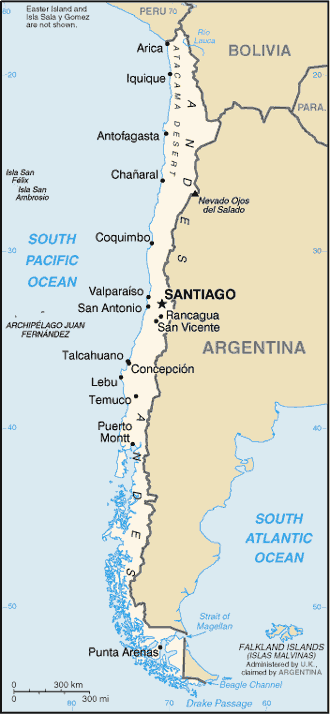Chile
Chile, officially the Republic of Chile, is a country in South America occupying a long, narrow coastal strip between the Andes mountains to the east and the Pacific Ocean to the west. It borders Peru to the north, Bolivia to the northeast, Argentina to the east, and the Drake Passage in the far south. With Ecuador, it is one of two countries in South America which do not border Brazil. The Pacific coastline of Chile is 6,435 kilometres. Chilean territory includes the Pacific islands of Juan Fernández, Salas y Gómez, Desventuradas and Easter Island. Chile also claims about 1,250,000 square kilometres (480,000 sq mi) of Antarctica, although all claims are suspended under the Antarctic Treaty.
 |
Prior to arrival of the Spanish in the 16th century, northern Chile was under Inca rule while the indigenous Araucanians inhabited central and southern Chile. Although Chile declared independence in 1810, decisive victory over the Spanish was not achieved until 1818. In the War of the Pacific (1879–83), Chile defeated Peru and Bolivia and won its present northern regions. It was not until the 1880s that the Araucanians were completely subjugated. Although relatively free of the coups and arbitrary governments that blighted South America, Chile endured a 17-year military dictatorship (1973–1990) that left more than 3,000 people dead or missing.
Currently, Chile is one of South America's most stable and prosperous nations. It leads Latin American nations in human development, competitiveness, quality of life, political stability, globalization, economic freedom, low perception of corruption and comparatively low poverty rates.[7] It also ranks high regionally in freedom of the press and democratic development. However, it has a high income inequality, as measured by the Gini index. In December 2009 Chile became the first South American country to be invited to join the OECD. Chile is also a founding member of both the United Nations and the Union of South American Nations.
 0
0 







Go to Forum >>0 Comments